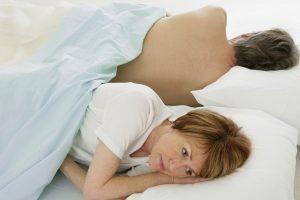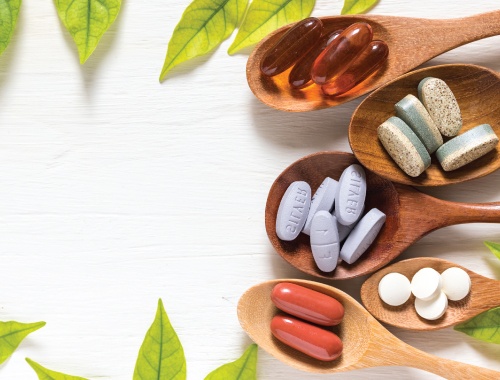
Low libido presents challenges within the medical community. Because it is suspected to be largely under-reported, determining the prevalence of this condition has proven to be a near-impossible feat for researchers. By some estimates, one in five men experiences low sex drive, but because many are hesitant to approach the subject with their physicians, actual figures could be much higher [1].
Adding to this challenge is the fact that there is no set standard for what constitutes a “normal” sex drive. Libido can wane and wax throughout the stages of one’s life and is even subject to factors we encounter daily. Stress, medical conditions, medications, hormonal changes, fatigue, and relationship issues are just a few of the most noteworthy influencers of libido. Thus, diagnosing and treating the underlying cause for the condition requires a comprehensive approach.
Common causes of low sexual desire and low libido include:
One thing is certain, however: the prevalence of low libido shows an increase with age which, in part, reflects the normal aging process. In other words, declining sexual desire can be expected, to some degree, in older adults. With that being said, there are psychological, sociological, and even medical factors which can contribute to low libido. Anxiety, depression, and substance abuse are common causes of low sexual desire, but there are also medical comorbidities associated with the condition. These include underactive thyroid, diabetes, and cardiovascular disease, to name a few [2].
The host of potential culprits behind decreased libido can be overwhelming to patients. If there are so many possible influencers, where does one begin when seeking out an effective solution? For Cenegenics age management specialists, it starts with taking an all-encompassing look at the individual’s physical condition. In addition to accurately diagnosing and treating any health issues, the clinicians also optimize the patient’s wellness across the major key areas of hormone regulation, physical fitness, nutrition, and stress management. In doing so, they provide the best possible odds of restoring sex drive, whether its diminishment has been caused by age-related factors, suboptimal health, or a combination of the two.
If you are among the 20% or more of the population experiencing low libido, discover the ways Cenegenics can help below.
Cenegenics helps increase libido and sex drive with:

Are sex drive and testosterone connected? This is one of the first questions physicians typically encounter when addressing declining sexual desire in their patients. Indeed, while the two are related, they are not one in the same.
Testosterone is a vital hormone that supports a healthy sex drive. It declines naturally with age and begins to progressively drop from the 40s onward. While testosterone can be linked to low libido, testosterone deficiency is its own recognized medical condition which is characterized by below-normal levels of the hormone. It is suspected that the condition could affect roughly one in three men over the age of 45, but its symptoms such as fatigue, weight gain, and low libido are often mistaken for signs of normal aging [3].
In clinical terms, the prevalence of testosterone deficiency is approximately 39%, though the rate can vary depending on specific diagnostic criteria. While its prevalence increases with age, it is also influenced by the level of awareness of both care providers and patients regarding common signs and symptoms. Although the normal ranges of testosterone are known to vary slightly among labs, the generally accepted ranges are 250-1100 ng/dl for total testosterone and 35-224 pg/ml for free testosterone.
If it is determined based on test findings that a patient has a testosterone deficiency, the Cenegenics physicians can recommend a tailored hormone replacement therapy program to optimize hormone production. While testosterone therapy can improve wellness and quality of life across a range of areas, including physical strength, energy, and weight regulation, the symptoms in the sexual domain, such as libido and erectile dysfunction, show the clearest and consistent benefit. In fact, more than 650 participants across 17 different studies showed that patients with testosterone less than 350 ng/dl will benefit from testosterone therapy in both libido and erectile dysfunction symptomology, with the greatest improvements experienced in the areas of morning and total erections, overall erectile function, and sexual motivation.
Cenegenics physicians are committed to taking the safest and most effective approach to treating hormone deficiencies. Not only does our clinical team manage total testosterone, but they also manage its impact on free testosterone, dihydrotestosterone (DHT), and estradiol. To do so, we collect baseline lab values on patients at specific intervals, thereby ensuring physicians have a complete understanding of how hormones are directly affecting carbohydrate and lipid metabolism, bioinflammatory markers, kidney and liver function, and prostate health. Our physicians are proactive in measuring the impact of hormones on these biomarkers and will dynamically shift goals and efforts, as needed, as patients respond and adapt over time.
Of course, while testosterone is often the first factor that comes to mind in addressing declining sexual desire, it is not the only influencer. Physical fitness can play a powerful role in libido – we will delve into this relationship in the next section.

In the medical world, exercise is often hailed as “the greatest pill ever.” With the ability to reduce inflammation, improve coordination and balance, and reduce the risk of serious diseases, it is among the most powerful methods adults have for boosting their health across their entire lifespan. And, while it is perhaps the least used therapy against chronic disease and ailments of age, it is one of the most effective and thoroughly studied solutions.
It should therefore come as no surprise that one of the potential benefits of regular exercise is increased sexual desire. Exercise increases energy and optimizes cardiovascular health to improve erectile quality. The link between erectile health and cardiovascular wellness is so strong that physicians have now begun to consider erectile dysfunction as a potential warning sign of heart disease or other circulatory problems. While there are many possible culprits behind interrupted blood flow to the penis, one potential cause is cholesterol-filled plaque buildup within the arteries. Thus, for some men, lifestyle changes such as losing weight and exercising can improve erectile function and, subsequently, sexual desire [4].
Beyond addressing physical influencers, exercise can also impact some of the emotional factors contributing to suboptimal sexual desire. Losing weight, strengthening the muscles, and improving overall fitness levels can have significant improvements on a person’s mental health. Specifically, boosted self-image and confidence can positively affect physical interest in sexual activity.
Nonetheless, it is important to note the fine line that exists between maintaining optimal physical fitness and exercising too much. A 2017 study published in Medicine & Science in Sports & Exercise examines the relationship between male libido and endurance training. While study participants in mid-range training intensities had greater odds of normal to high libido states, those with the highest training intensity experienced lower states. Training duration also affected libido, with participants of shorter and mid-range sessions experiencing higher sex drive than those with the greatest duration. Thus, too much exercise can actually negatively affect libido [5].
When exploring the best fitness program to optimize not only your sex drive but also your overall health, choosing among the various approaches can be overwhelming. With so many factors to consider, including duration, intensity, and exercise type, many individuals simply guess at the best type of training and are left disappointed when they fail to notice results. Cenegenics physicians, on the other hand, take a proven approach. They provide tailored exercise recommendations based on each patient’s unique needs, with the goal of optimizing results in the shortest amount of time possible. High-intensity interval training is a preferred training method within the program, as it does not require a significant time investment but yields favorable outcomes.
As you may have suspected, exercise and diet often go hand-in-hand when it comes to addressing most areas of health. Libido is no exception, which is why we explore the impact of nutrition on sexual health in the following two sections.

Diet optimization has profound impacts on the body. Nutrition affects energy levels, weight, and countless functions the body must perform to maintain optimal health. One often overlooked aspect of wellness in the sexual realm is diet.
Unfortunately, we are facing a global epidemic in which eating has become an activity driven by factors like pleasure and convenience. We no longer eat to provide our body with the nutrients it needs to operate well and avoid diseases; instead, packaged and processed foods are often chosen because they are quick, easy, and satisfying. These foods, which are predominant in Western diets, have little nutritional value and can contribute to factors such as poor insulin sensitivity, a leading precursor for conditions that impact sexual health, including cardiovascular disease and inflammation.
Cenegenics physicians recommend a way of eating that supports sexual desire instead of diminishing it. One shared priority across all tailored dietary programs is optimization of insulin sensitivity. Insulin, the hormone responsible for controlling blood sugar levels, is produced in the pancreas and moves sugar from the blood into the body’s storage reserves. When cells become resistant to insulin as a result of poor diet, they are no longer able to use insulin effectively. This allows blood sugar levels to spike at abnormally high levels and spurs a vicious cycle in which the pancreas creates more insulin to reduce blood sugar levels. Eventually, this can deplete the pancreas of insulin-producing cells, a trend commonly seen in individuals with type 2 diabetes. Unsurprisingly, low libido affects people with diabetes more than those without [6]. Lack of interest in sex and sexual dissatisfaction are also reported by people with cardiovascular disease – a condition in which insulin resistance is a common symptom [7].
Thus, while eating healthy will not necessarily directly increase sexual desire, it can certainly address many of the culprits behind low libido. Dietary approaches recommended by Cenegenics nutrition specialists prioritize the consumption of a healthy blend of macronutrients, including options such as low-carbohydrate/high-protein diets. These eating plans help patients address the cardiovascular stressors that inhibit blood flow while also controlling issues such as insulin sensitivity and inflammation.
Like exercise, an improved diet can also lead to weight loss or regulation, which can further contribute to the emotional influencers behind low libido. Following a healthier approach to eating can help patients improve their self-image and confidence, which may also boost physical interest in sexual activity.
One final aspect of diet, which Cenegenics physicians may advise patients to address in order to support sexual desire, is alcohol consumption. Not only can alcohol consumption impede cognitive function, it can also diminish libido. Alcohol causes the blood vessels to dilate, influencing the way the blood flows to and from the penis. It also contributes to dehydration, which impacts sexual performance and arousal [8].
The American Heart Association advises a daily allowance of one to two drinks per day for men, and while moderate alcohol consumption may produce benefits such as improved cardiovascular risk factor profile and reduced mortality, it is also linked to increased cancer risk. Additionally, moderate alcohol consumption can also lead to episodic binge drinking. Any health benefits achieved through alcohol can also be attained through nutrition and exercise alone.
Nonetheless, if you fall into the majority of Americans for whom drinking alcohol is a daily or weekly activity, you can rest assured that moderate consumption should not take a significant toll on your sex drive. For the top 30% of Americans who drink regularly, one drink per evening is the average rate of consumption [9]. While Cenegenics physicians advise the reduction of alcohol intake, modifying consumption with meals may be advised, depending on the patient’s goals, lifestyle, and specific needs analysis.
Despite limiting alcohol consumption and eating well, many modern diets still leave nutritional gaps which could affect libido. In the next segment, we will discuss how Cenegenics’ nutraceuticals can be used to address deficiencies for improved sex drive.

Cenegenics physicians recommend nutraceuticals for patients with identified needs for specific supplements. While nutraceuticals can improve overall health, certain micronutrients can also support optimal sex drive, too.
For instance, natural adaptogens such as maca root, ashwagandha root, and similar herbs may naturally enhance the desire for sex. Mushroom-based supplements, such as those from red reishi mushrooms, also have anti-inflammatory and anti-bacterial properties which can aid in stress management and immunity to help address loss of libido. Zinc, too, supports natural testosterone levels and can contribute to enhanced sex drive [10]. While foods high in lycopene, a powerful nutrient with antioxidant properties, can improve virility by maintaining prostate gland health, it can also be taken in supplement form. Finally, the omega 3 essential fatty acid is a building block of sex hormones, and taking it regularly can raise dopamine levels to trigger arousal.
When it comes to nutraceuticals, it is important to remember that doses should always be overseen by a physician. Moreover, supplements are not subject to nearly as strict regulation as pharmaceuticals. Purity and potency are either up to the consumer to research or the manufacturer to offer, and because many patients do not report supplements with their regular medications, drug interactions could pose a serious risk. The quality of the source is also critical. Our clinicians recommend nutraceuticals that are significantly different from generic, retail-grade supplements. Our patients receive custom pharmacy items and efficaciously dosed, pharmaceutically-tested clinical nutraceuticals.
A final but important component of optimizing libido is effective stress management. We will discuss this topic briefly in the following section.

Interestingly, while stress can impact your sex life, it can also be alleviated by having sex. Unfortunately, however, there is no simple fix for chronic stress which impacts physical health in far-reaching ways, including lowering sexual desire. While some stress is normal and even healthy, the prolonged, chronic stress many individuals face can have adverse effects on health. Chronic stress produces cortisol, a hormone that can suppress sex hormones when elevated for long periods of time [11].
While there is no single way to address stress in all individuals, Cenegenics physicians excel in addressing the far-reaching impacts of stress. Our stress mitigation plans are all-encompassing to address all of the areas of your well-being which stress can affect. Targeted treatments are employed to achieve lasting improvements in sleep quality and duration, cognition, and energy levels, which can help patients approach life’s many challenges with a mindset that is free of stress and anxiety.

While there are many potential causes behind low sex drive, Cenegenics clinicians perform robust testing at the start of each patient’s age management program to uncover any causative agents quickly and efficiently. In some cases, the cause of low libido could be easily identifiable, as is the case with low testosterone. In others, treating a broad range of health factors with proven solutions may be necessary for optimizing overall health for improved sexual desire.
Regardless of the specific factors influencing your libido, Cenegenics is the leading source for achieving lasting, noticeable improvements in sexual health. Libido is a key pillar in our comprehensive age management program, and by optimizing the additional areas of health, our clinicians can help you restore your desire and satisfaction once again.
Our world-class physicians create a personalized plan to help you feel 10+ years younger. You’ll be more energetic, lose weight, sleep better, have more libido, and think more clearly. Visit our website for more information, as well as to book your free consultation.
Textbook of Age Management Medicine Authors:
Jeffrey Park Leake, M.D., CPT
Dr. Jeffrey Park Leake is a Partner and Director of Education at Cenegenics Elite Health specializing in age management and wellness. Having trained hundreds of physicians worldwide, Dr. Leake is also the Director of Education for the Clinical Strategies for Healthy Aging course at AMM Educational Foundation.
Todd David Greenberg, M.D., CSCS
Dr. Todd Greenberg is a practicing physician with a broad range of expertise, including wellness, exercise, sports injuries, and MRI of sports injuries. He is a Radiology Clinical Associate Professor at the University of Washington.
Additional Resources
What is Age Management Medicine?
The Dangers of Processed Foods
Symptoms and Long-Term Consequences of Stress
How Cenegenics Can Help Relieve Stress in Executives & Professionals
Understanding Hormone Replacement Therapy & Low Testosterone
Defy Your Age™ with Cenegenics
How Cenegenics Programs Differ from a Typical Weight Loss Program
References
[1] DeNoon, Daniel J. “When a Man’s Sex Drive Is Too Low.” WebMD. 21 May 2009. Retrieved from URL: https://www.webmd.com/sex-relationships/features/when-a-mans-sex-drive-is-too-low#1
[2] Mestrovic, Tomislav, MD, PhD. “Low Libido.” News Medical. 23 Aug. 2018. Retrieved from URL: https://www.news-medical.net/health/Low-Libido.aspx
[3] Allerhand, Rhalou. “Low libido: the facts about low male sex drive.” Netdoctor. 31 Jul. 2018. Retrieved from URL: https://www.netdoctor.co.uk/conditions/sexual-health/a2251/lack-of-sex-drive-in-men-lack-of-libido/
[4] Skerrett, Patrick J. “Erectile dysfunction often a warning sign of heart disease.” Harvard Health Publishing. 24 Oct. 2011. Retrieved from URL: https://www.health.harvard.edu/blog/erectile-dysfunction-often-a-warning-sign-of-heart-disease-201110243648
[5] Anthony C. Hackney et al. “Endurance Exercise Training and Male Sexual Libido.” Medicine & Science in Sports & Exercise. Feb. 2017. Retrieved from URL: https://www.researchgate.net/publication/313740861_Endurance_Exercise_Training_and_Male_Sexual_Libido
[6] Neithercott, Tracey. “Sex and Diabetes: What You Wanted to Know.” Diabetes Forecast. November 2012. Retrieved from URL: http://www.diabetesforecast.org/2012/nov/sex-and-diabetes-what-you-wanted-to-know.html
[7] Elisabete Rodrigues Nascimento et al. “Sexual dysfunction and cardiovascular diseases: a systematic review of prevalence.” Clinics. Nov. 2013. Retrieved from URL: https://www.ncbi.nlm.nih.gov/pmc/articles/PMC3812559/
[8] Borelli, Lizette. “Alcohol And Sex.” Medical Daily. 15 Oct. 2015. Retrieved from URL: https://www.medicaldaily.com/alcohol-and-sex-what-whiskey-penis-and-how-does-it-affect-male-libido-357278
[9] Ingraham, Christopher. “Think you drink a lot? This chart will tell you.” Washington Post. 25 Sept. 2014. Retrieved from URL: https://www.washingtonpost.com/news/wonk/wp/2014/09/25/think-you-drink-a-lot-this-chart-will-tell-you/?utm_term=.ce66309d2bd3
[10] “6 Benefits of Zinc for Men’s Health.” Prostate.net. 09 Nov. 2015. Retrieved from URL: https://prostate.net/articles/benefits-of-zinc-for-mens-health
[11] Scott, Elizabeth, MS. “How Stress Can Cause a Low Libido.” Verywell Mind. 19 Oct. 2017. Retrieved from URL: https://www.verywellmind.com/how-stress-can-lead-to-low-libido-3145029


